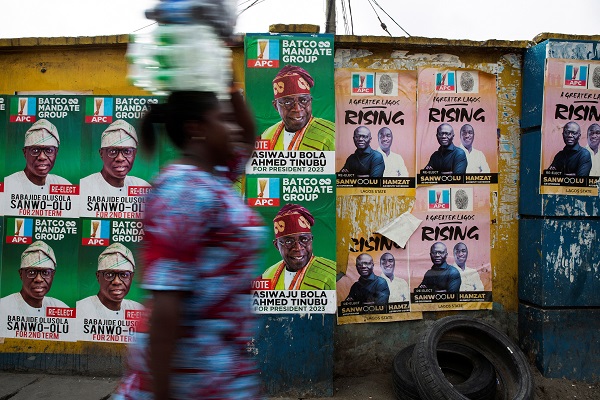 A woman walks past election posters of APC party candidates including presidential hopeful Bola Ahmed Tinubu in Lagos, Nigeria, 24 February 2023;
Credit: Reuters/James Oatway
A woman walks past election posters of APC party candidates including presidential hopeful Bola Ahmed Tinubu in Lagos, Nigeria, 24 February 2023;
Credit: Reuters/James Oatway
LAGOS (Reuters) - Nigerians will return to the polls on Saturday 11 March 2023 to elect state governors across the country, two weeks after a disputed presidential election, with the main focus on the race to lead Lagos, the country's economic heartbeat and wealthiest state.
The election is for 28 of the country's 36 governors, who are among the most influential politicians in Nigeria, Africa's biggest economy and largest oil producer.
Some states, such as Lagos, control budgets larger than those of small nations.
The Ruling All Progressives Congress (APC) party's Bola Tinubu was declared winner of the presidential election with 39% of the vote. But he lost in his home state of Lagos to opposition candidate Peter Obi of the Labour Party, which is aiming to upset APC again in the state.
Lagos is important for Bola Tinubu because it is where he built his political and financial powerbase, serving two terms as governor until 2007 and playing a key role in picking every successor since. Losing Lagos could erode Bola Tinubu's influence in the state of more than 20 million people.
"It will send a big signal of political vulnerability if the first Lagos state race the APC loses is one where Tinubu is president-elect," said Ikemesit Effiong, head of research at security consultancy firm SBM Intelligence. "It is unprecedented that the party of a sitting Nigerian president doesn't control his home state. Tinubu, through the APC and its predecessor parties, has always been in charge of Lagos politics."
Lagos is the commercial hub of Africa's biggest economy, has a flourishing tech sector, generates the most revenue in Nigeria and has the continent's biggest deep seaport. It is also where Africa's richest man Aliko Dangote is building a multi-billion dollar oil refining complex.
Buoyed by Peter Obi's performance in Lagos, the Labour Party's Gbadebo Rhodes-Vivour, an architect and political activist, will battle it out with APC incumbent Governor Babajide Sanwo-Olu, who has been in the ranks of the Lagos state government for two decades.
Electoral commission criticised
The APC has sitting governors in 21 states, while the main opposition People's Democratic Party (PDP) has fourteen. The Labour Party is aiming to win its first governorships in this cycle.
The Independent National Electoral Commission (INEC) will be under scrutiny after its handling of the 25 February vote.
Observers from the European Union (EU), the Commonwealth and other bodies reported a range of problems, among them failures in systems designed to prevent vote manipulation, and criticised the INEC for poor planning and voting delays. But they did not allege fraud.
The commission has said it would use electronic machines to send results to a public portal soon after voting, which it promised but struggled to do last month.
The race in northeastern Adamawa, the home state of PDP leader Atiku Abubakar, is also being closely watched. The APC candidate has a chance to win and become Nigeria's first elected female governor, according to some polls.
Voters will also choose state house of assembly members.








